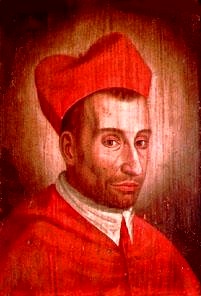Monday, May 26, 2014
Saints: Role Models for Men-St. Charles Borromeo
Right off the bat, I'm talking about a saint that is incredibly near and dear to me. I grew up in the city of St. Charles, MO, went to Mass and received some schooling at St. Charles Borromeo parish, and I chose him as my confirmation saint. Even when I traveled to the Northwest for Reach, I still found St. Charles Borromeo following me since he has two buildings dedicated to him on the campus of Carroll College in Helena. There are so many churches and seminaries named after this Italian man who became a bishop at age 25. Let's look at why.
From the Rich to the Poor
St. Charles was born the second son of a noble family in Milan. Being noble at the time also meant being super rich. The Borromeos were also kin to the Medici family, the most powerful and wealthy family in the Italian region at the time. In fact, St. Charles' uncle, a Medici, eventually became Pope Pius IV. Even as a young boy, St. Charles was said to give most of his money and other resources to the beggars that came to his family's home and other poor people he found throughout Milan.
Eventually, after becoming bishop of the Archdiocese of Milan, St. Charles devoted his resources to serving as many poor people as possible. This was during a time when he was not only a priest, but also the head of his family (more on that later). He even went in to debt during an outbreak of the plague to feed and heal the people that had been abandoned by the city's officials and other nobles.
Natural Leadership
At 18 years old, St. Charles was asked by his uncle, the Pope, to help at the Vatican. It was pretty much office and administrative-type work, but these types of jobs involved serious responsibilities. Young Charles was known for his high intellect and soon held multiple offices before becoming bishop.
When he was bishop of Milan, the plague spread throughout the region. Many of the city's officials, including the governor, fled the city to remain safe and healthy. St. Charles, meanwhile, as a disciple of Christ, led by example. He stayed in the city and ministered to as many people as he could.
Vocational Discernment
During this period as a young man, while living and serving at the Vatican, St. Charles' parents and his older brother had passed away. This made him the 'man of the house' for his immediate family. This meant that St. Charles was receiving lots of pressure to become a married man and lead his noble family. However, he was a cardinal-deacon and served the Pope at the Vatican, meaning he was already on a path towards the priesthood. He soon discerned that the right thing to do was enter the priesthood, though St. Charles still took on the responsibilities of being the leader of his family. At the age of 25, St. Charles was named bishop of the Archdiocese of Milan (did I mention that already?).
The Council of Trent.
St. Charles may not have been there for the start of the Council of Trent, but he was there to finish it. The Council of Trent was established to respond to the Protestant Reformation, which not only questioned various Catholic doctrines but also threw Catholic-Christianity into chaos. The Council of Trent had been on hiatus for ten years before Pope Pius IV started it back up again, along with the encouragement of St. Charles.
St. Charles was almost like glue that held the council together til the end, even though he was not a part of the council itself. He still had administrative responsibilities and kept the council members on task as they established the true doctrine of the Catholic Church.
Calling Men to be Better
When St. Charles dedicated himself to the needs of his Archdiocese, he evangelized to not just the laity but to the clergy as well. He discerned that the Archdiocese needed reforming and that the clergy, as the leaders of the local church, were responsible for leading the lay peoples and therefore the clergy needed to be strong leaders. He would replace any priests that did not uphold doctrine or were just plain lazy with new priests who were zealous about the faith. Also, during that exodus of city officials during the plague, St. Charles wrote to the governor and pretty much told him (I'm paraphrasing here a little): "Hey, if you're in charge of the city, man up, get back here, and help the people you're in charge of!".
Of course, there's many other things that St. Charles did in his lifetime. However, I know that long blog posts can get boring and eventually there has to be a stopping point. These are just the main reasons why I personally look up to St. Charles Borromeo and try to apply what I learn about him to my own faith life.
Subscribe to:
Post Comments (Atom)

No comments:
Post a Comment